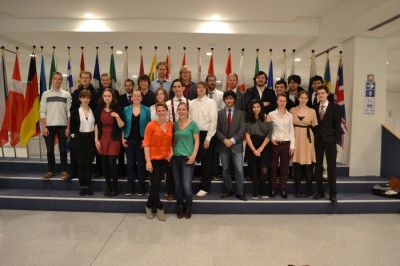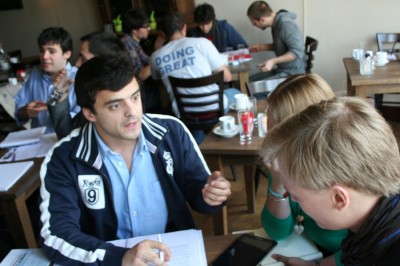A trip to Maastricht and Brussels with Debate Changing Europe
Die Achte Minute hat bereits in der Vergangenheit über das Programm Debate Changing Europe berichtet. Jetzt fuhren die Gewinner und Organisatoren von sechs europäischen Turnieren, unter anderem der ZEIT Debatte Aaachen sowie des Vienna IVs, für eine Woche zu Workshops nach Maastricht und Brüssel. Anne Valkering war mit dabei und schildert uns ihre Eindrücke.
Thirty students from several European countries convened in Maastricht under the banner of Debate changing Europe from June 2 to 6. The Common European Event aimed to increase their understanding of the inner workings of the European Union. They met up with people working on the ground in Brussels and discussed the topic of youth employment and how European youth can influence European politics on this specific topic. The participants have now returned home with a lot of new impressions and knowledge about the EU. They will share these with other youth in the next academic year.
The event kicked off on Monday June 3 with a training on lobbying skills by Peter Sluiter from Practical Politics EU in Maastricht. The training included theoretical information on lobbying and the practical workings of the European Union as well as a list of do’s and don’ts of lobbying, followed by strategies for effective lobbying and the types of information needed to develop those strategies. It concluded with instructions on how to identify who to talk to and the ways to identify these people within European Union institutions.
The students then split up into groups representing youth labour unions, the elderly, employers, the European Commissions, representatives of some of the member states and a lobbying group EUROFOUND. These prepared meetings on the issue of youth employment in which they identified strategies to convince their counterparts of their point of view.
The following discussions were heated and the participants avidly stuck to their positions. All the students brought in interesting points and the discussion went into great depth. The variety of points of views from their token positions, the diversity of nationalities present brought out views from all sorts of perspectives: from the Portuguese concern on youth unemployment to the German perspective of youth internships.
The participants moved to Brussels on Tuesday the 4th of June. They toured the European Parliament and met with different actors in the European Union. They first met Maria João Cocco who is an assistant to the Portuguese Member of the European Parliament Vital Moreira. She gave a unique insight into the work of MEPs (and their assistants) and how lobbying plays a role in that.
Next up was Director Andrew Bradley of the International Institute for Democracy and Electoral Assistance (IDEA). He talked about the ways in which NGOs can influence the policy formation and that the network of an NGO is essential in their pursuits. Without a network of contacts, your influence will always be limited as who you know determines so much.
Last up were three professional lobbyists from public advocacy firm APCO. Emma-Louise Wilson, Antonio Neves-Costa and Alex Whalen discussed the ways in which a lobbying firm chooses its clients, what ethical concerns they deal with and how they represent their clients. They described how open the European lobbying process is and how it gives chances of participating to all sides of an issue. In addition, they gave the participants a great insight into the social life of the European city and how they would need to try to enter it.
The last day of the training program started with a relaxing boat trip on the Meuse/Maas river for which Maastricht is named. They then moved back into gear when Aaron Vinnik and Bart Runneboom from Maastricht University provided the students with theoretical insights into the workings of the European Union. They discussed the ways a policy idea becomes a proposal and turns into law. The students then designed lobbying attempts for a number of important stages in the legislative process.
The participants have learned a great deal through these trainings and the insights from Brussels. They have a much broader understanding of the balances and nuances within the European Union. They will be giving workshops on the basis of their own experiences in the next academic year. The participants discussed the format for the trainings, the materials needed for them and the ways in which they can be promoted. The discussion then moved towards the question how youth could be engaged with this project and be motivated to become more active in European politics through the project. The overall mood was positive, and lots of good ideas were put out to make this project a blueprint for future events.
IDEA will now look into the ideas brought forward by the participants and try to make use of as many of their inputs as is feasible to make the positive impact that Debate changing Europe has had on the participants last as long as possible and will spread to as many other people as we possibly can.
Anne Valkering/ ak







